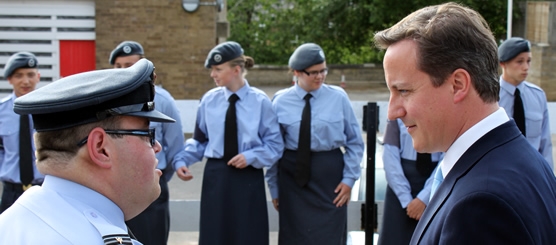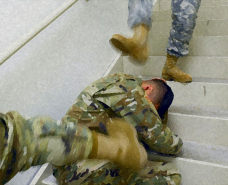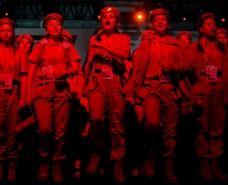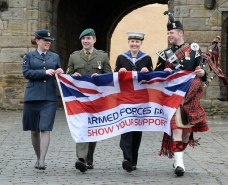Young People, the Military, and the Aftermath of the UK’s General Election

It has been more than a month since the General Elections in the UK which ended up with a Conservative Party majority in the Parliament. We asked Forces Watch* to review these results and their implications on the militarisation of youth in the UK for Antimili-Youth.
In the UK, there are long-standing and newer aspects to the militarisation of youth — or, as the Ministry of Defence (MoD) prefers to call it, the military’s ‘youth engagement’. One of the long-standing aspects is that children may apply to join the army at 15 years and 7 months of age, or apply to join the navy and air force at 15 years and 9 months, then enlist when they are 16. The Green Party, which holds one seat, is the only party represented in the new Westminster parliament which has explicitly advocated raising the age of recruitment to 18 — albeit with the help of one seemingly rogue Liberal Democrat — and that not in the run-up to the last general election1. Plaid Cymru (the Party of Wales), which holds three seats in the Westminster parliament, has in the past backed calls to ban the armed forces from Welsh schools2, but has not raised the issue recently, though a forthcoming report by the Welsh Assembly petitions committee may give the party an opportunity to raise the issue once more. The three main parties which comprise the new Westminster parliament — the Conservatives, Labour, and the Scottish National Party — have all supported newer aspects to the military’s youth engagement, in addition to their continued support for or silence on the recruitment of children. ForcesWatch supporters asked their local candidates about this during the election campaign, and those candidates who responded from the parties with parliamentary representation betrayed a worrying ignorance, for example stating that under-18s in the armed forces cannot be deployed — despite the fact that there are legal loopholes which allow them to be – for reasons such as ‘the successful completion of the military mission’ and ‘operational effectiveness - as well as the fact that 22 under-18 year olds are known to have been deployed in error to Iraq and Afghanistan.3
ForcesWatch supporters also asked about the newer aspects of the military’s ‘youth engagement’. One of the most blatant examples of this is the ‘military ethos in schools’ initiative brought in by the last government which was formed by the Conservatives and Liberal Democrats. The Conservatives, who form the new government alone, with a slender majority of 12 seats, plan to steam-roll ahead with this initiative, for example aiming to have 500 cadets units — military style youth groups funded by the Ministry of Defence — in state schools by 2020, meaning an increase of 150.4 The previous Labour government had also considered bringing in such an policy and can be said to have laid the groundwork for the broad acceptance of such initiatives when it commissioned its ‘National Recognition of Our Armed Forces’ report in 2008, which set out no fewer than 40 possible ways in which the relationship between the UK’s civilian society and armed forces might be ‘strengthened’.5 It has since become increasingly difficult to criticise anything related to the armed forces. This in turn perhaps accounts for why the leader of the Scottish National Party explicitly decried a proposal by Scotland’s biggest teaching union to ban armed forces recruitment in schools, describing it as ‘army bashing’.6 Unsurprisingly, none of the candidates from parties with seats in the Westminster parliament who responded to ForcesWatch supporters’ question about the newer aspects of the military’s ‘youth engagement’ had anything very critical to say.
The parliamentary-political consensus seems clear: full steam ahead with military exposure and military initiatives for young people. However, when the Ministry of Defence recently sought top-tier access to the National Pupil Database — access to information such as whether a pupil receives free school meals, which is the government’s measure of deprivation — the better to ‘target its messaging’ at such young people, the Department for Education declined the request on the basis that the MoD’s access to such data would not be in pupils’ interest.7 Ironically, had the MoD been granted the access and thus not been able to claim, as it has attempted to do, that it sought the information in error, this would have undermined its continued claim that the armed forces do not recruit in schools. That the access was denied and that the MoD feels the need to deny recruiting in schools however, shows that even in the increasingly militarised UK context, there is still a line beyond which the military's 'youth engagement' becomes unacceptable.
*This article is written by Forces Watch for Antimili-Youth. Forces Watch scrutinises the ethics of armed forces recruitment practices and challenges efforts to embed militarist values in civilian society in the UK.
Photo: AirCadets
-----------
1 https://www.greenparty.org.uk/News/2010-10-11-armed-forces-recruitment-age-edm.html
2 https://www.facebook.com/cndcymru/posts/414165775272404
3 http://www.theyworkforyou.com/wrans/?id=2007-02-01b.117280.h http://www.publications.parliament.uk/pa/cm201314/cmhansrd/cm130521/text/130521w0003.htm#1305224002178
4 http://www.theyworkforyou.com/wrans/?id=2015-06-02.900130.h&s=cadet#g900130.r0
5 http://www.ppu.org.uk/militarism/recognition_of_our_armed_forces.pdf
6 http://www.auroranews.co.uk/call-to-end-british-armed-forces-recruitment-in-scottish-schools/
7 http://www.forceswatch.net/blog/targeted-messaging-schools-about-armed-forces-careers-not-well-being-students-0
Countering Military Recruitment

WRI's new booklet, Countering Military Recruitment: Learning the lessons of counter-recruitment campaigns internationally, is out now. The booklet includes examples of campaigning against youth militarisation across different countries with the contribution of grassroot activists.
You can order a paperback version here.








